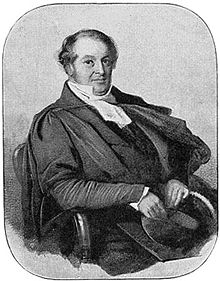Baden Powell (mathematician)
| Baden Powell | |
|---|---|
 |
|
| Born | 22 August 1796 |
| Died | 11 June 1860 (aged 63) Kensington, London, England |
Baden Powell, MA, FRS, FRGS (22 August 1796 – 11 June 1860) was an English mathematician and Church of England priest. He held the Savilian Chair of Geometry at the University of Oxford from 1827 to 1860. Powell was a prominent liberal theologian who put forward advanced ideas about evolution.
Powell married three times, and had fourteen children in total.
Powell's first marriage on 21 July 1821 to Eliza Rivaz (died 13 March 1836) was childless.
His second marriage on 27 September 1837 to Charlotte Pope (died 14 October 1844) produced one son and three daughters:
His third marriage on 10 March 1846 (at St Luke's Church, Chelsea) to Henrietta Grace Smyth (3 September 1824–13 October 1914), a daughter of Admiral Smyth, produced seven sons and three daughters:
Shortly after Powell's death in 1860, his wife renamed the remaining children of his third marriage 'Baden-Powell'; the name was eventually legally changed by Royal Licence on 30 April 1902. Baden Henry Powell is often also referred to as Baden Henry Baden-Powell.
Powell was an outspoken advocate of the constant uniformity of the laws of the material world. His views were liberal, and he was sympathetic to evolutionary theory long before Charles Darwin had revealed his ideas. He argued that science should not be placed next to scripture or the two approaches would conflict, and in his own version of Francis Bacon's dictum, contended that the book of God's works was separate from the book of God's word, claiming that moral and physical phenomena were completely independent.
His faith in the uniformity of nature (except man's mind) was set out in a theological argument; if God is a lawgiver, then a "miracle" would break the lawful edicts that had been issued at Creation. Therefore, a belief in miracles would be entirely atheistic. Powell's most significant works defended, in succession, the uniformitarian geology set out by Charles Lyell and the evolutionary ideas in Vestiges of the Natural History of Creation published anonymously by Robert Chambers which applied uniform laws to the history of life in contrast to more respectable ideas such as catastrophism involving a series of divine creations. "He insisted that no tortured interpretation of Genesis would ever suffice; we had to let go of the Days of Creation and base Christianity on the moral laws of the New Testament."
...
Wikipedia
